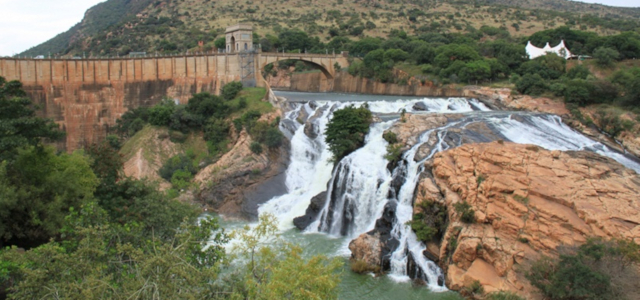This was revealed at the NEPAD Strategic Dialogue on Advancing Infrastructure Development in Africa technical meeting held in Victoria Falls, Zimbabwe on 25-26 June, 2018. The NEPAD Dialogue is a multi-stakeholder’ consultation aiming to generate concrete policy recommendations and strategies to the Africa’s leadership in relation to infrastructure projects implementation, under the umbrella of the Programme for Infrastructure Development in Africa (PIDA).
Global Water Partnership Southern Africa’s Kidanemariam Jembere (Technical Advisor) and Remmy Makumbe (Special Advisor) participated in the meeting and took the opportunity to introduce the Africa Investment Programme (AIP) including the recent collaboration between NEPAD and GWP on PIDA-Water and the upcoming Training Workshop on Water Projects Preparation for GCF funding.
PIDA was endorsed at the African Union Assembly Heads of State level in February, 2012. The Presidential Infrastructure Championship Initiative (PICI) is providing high level political mechanism for infrastructure development in Africa, through specific Heads of State providing leadership to specific projects, thereby unlocking funding as well as unblocking political bottlenecks on projects.
The meeting reviewed the financial potential of Pension and Sovereign Wealth Funds to invest into Africa’s Infrastructure. There is huge potential role of institutional investors in financing infrastructure development in Africa - some estimates show that US$108 billion/year is required to close the infrastructure deficit in Africa. However, the national and regional regulatory frameworks that control institutional investment in Africa need to be addressed. For example, some of the constitutions that established pension funds do not allow investment in development projects. On the other hand, institutional investors need to be convinced that infrastructure is an investable asset.
The meeting also reviewed NEPAD 5 percent Agenda towards increasing the allocations of African institutional investors to African infrastructure from its low base of approximately 1.5 percent of assets under management (AUM) to an impactful 5 percent of AUM. The meeting recognised the need to develop the necessary enabling instruments to facilitate access to institutional investment facilities.
It was revealed that the existing guarantee instruments that support Africa’s infrastructure are partial guarantee instruments with varying conditionality and complex requirements for qualification and access. The meeting reviewed different modalities/options of setting up an African Guarantee Facility for PIDA Infrastructure projects. The Facility will help attract institutional and private investment in infrastructure projects in Africa with the aim of meeting the NEPAD 5 percent Agenda.
A key observation was that private sector funding for water was limited, and as such the need for guarantee in the sector was equally low. However, for the PIDA Water programme, the recommendation was to utilise the facilities set up for the rest of PIDA projects, and a separate AIP Guarantee facility could be explored.
The meeting was advised that NEPAD Agency and its partners have developed a scalable methodology to track, estimate and optimize the job creation potential of large-scale infrastructure projects in Africa. This methodology is now being developed into an on-line Job Creation Toolkit that will allow Project Owners, governments, technical partners, and investors to assess how project design impacts job creation and potential ways to maximize jobs. Documenting the job creation impact can also serve to mobilize the strong political and financial support needed to develop and finance infrastructure projects.
The Forum also recognized that the existing Project Preparation Facilities (PPFs) focus on supporting the mid/late stages of project preparation without considering support to progress from concept to a point where they meet PPF application criteria. This lack of technical and financial capacity at this stage of preparation is recognized as one of the key bottlenecks in enabling regional infrastructure projects to reach financial close. The PIDA Service Delivery Mechanism (SDM) was developed and established by the African Union Commission and the NEPAD Agency as a specific instrument to address this challenge. The SDM instrument tackles the lack of technical and financial capacity during the project preparation phase by providing technical advisory to PIDA Projects in the project preparation cycle.
The issue of bankability of Africa’s priority infrastructure projects constitutes the key bottleneck in attracting private capital. The meeting discussed the complexity of the institutional landscape of transboundary projects and how it affects the investability of such projects. It also emphasised the need to focus on supporting the preparation of good quality and bankable infrastructure projects.
The two-day meeting was organized to technically review the above work streams of the strategic dialogue. The meeting brought together representatives of development finance institutions, private sector executives, regional economic communities, and infrastructure project authorities and projects developers. A follow up session shall be held later this year to firm up on concrete proposals and strategies to be implemented concurrently with PIDA II that is currently being developed.
